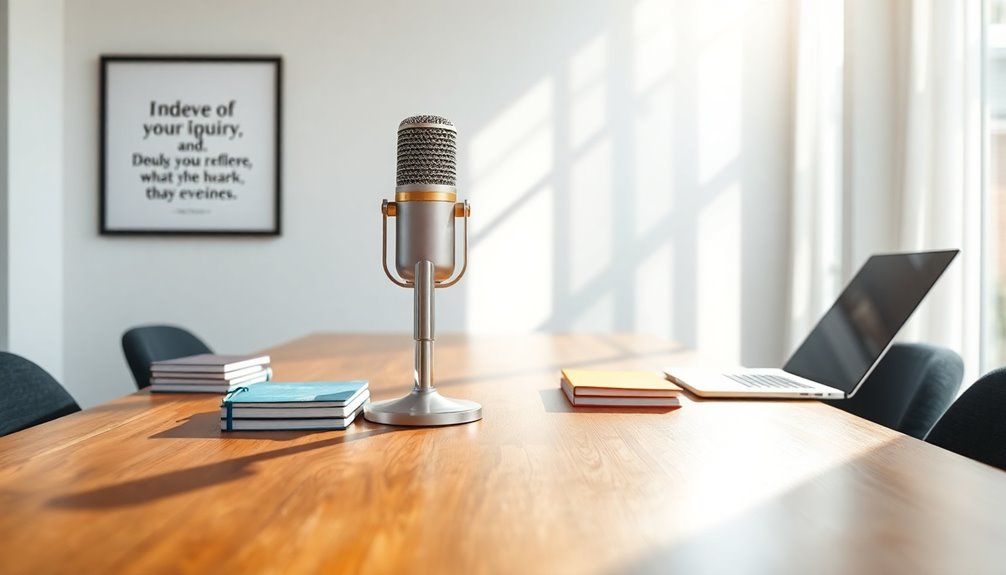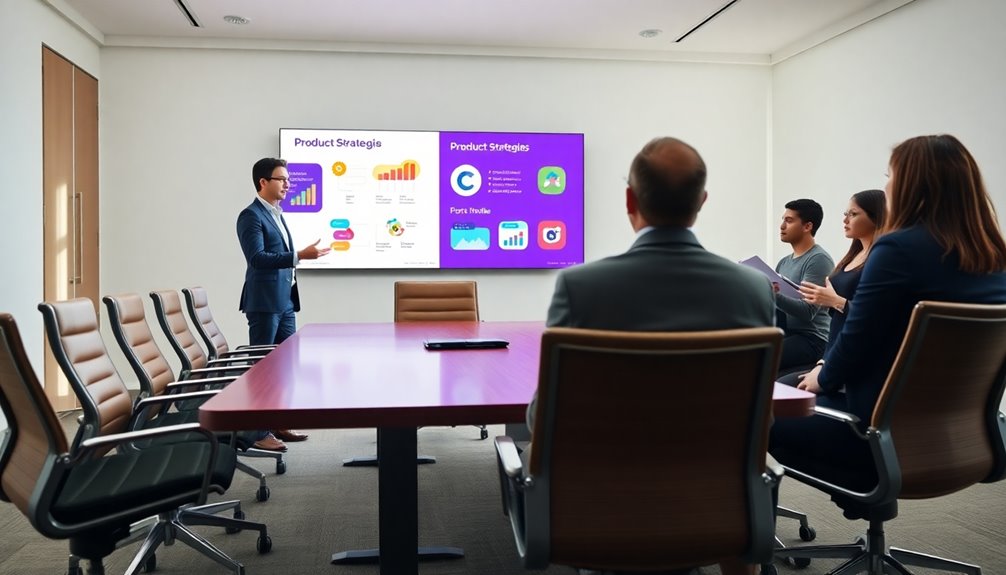Asking questions during your interview is essential. It shows genuine interest and transforms the conversation into a two-way street. This approach not only boosts your confidence but also helps you understand the company culture and job responsibilities better. Thoughtful inquiries about career growth and team dynamics demonstrate your long-term ambition and alignment with company values. Plus, it leaves a positive impression on the interviewer, highlighting your credibility. You'll learn which questions to ask and how to prepare effectively as you explore this topic further, paving your way to success in your next interview.
Key Takeaways
- Asking questions transforms the interview into a two-way conversation, showcasing your genuine interest in the role and company.
- Inquiries about job responsibilities and expectations signal your commitment and critical thinking skills, enhancing your professional image.
- Engaging with the interviewer through thoughtful questions alleviates anxiety and boosts your confidence during the interview process.
- Understanding company culture through questions helps determine if your values align, fostering a stronger connection with the organization.
- Thoughtful follow-up questions can leave a lasting impression, demonstrating your enthusiasm and reinforcing your suitability for the role.
Importance of Showing Interest

During your interview, showing genuine interest is essential for making a positive impression. When you demonstrate research and understanding of the job description and the company's needs, it signals your commitment to the role. This not only highlights your alignment with the job requirements but also indicates that you're enthusiastic about the opportunity.
Interviewers appreciate candidates who show this level of interest, as it builds trust and confidence in your motivations. Moreover, assessing commitment to the role can provide insight into your personality and work style, further showcasing your fit for the position.
Additionally, aligning your values with the company's mission and culture is vital. When you express appreciation for their initiatives or projects, it shows you're willing to contribute to their goals. This alignment enhances your chances of integrating smoothly into their team.
Discussing career growth opportunities within the company also illustrates your ambition. By showing that you understand their internal development programs and how they align with your own goals, you indicate a long-term commitment.
Finally, emphasizing your relevant skills and experiences strengthens your case, as it shows you can effectively perform the job duties. Overall, your genuine interest can set you apart and make a lasting impact during your interview.
Types of Questions to Ask

Asking insightful questions during your interview not only reflects your genuine interest but also helps you gather important information about the role and company. You can use various types of questions to achieve this.
Start with behavioral questions, which explore past experiences. For example, inquire about a time when you resolved a conflict with a coworker. This helps assess your reaction to challenges and your history of behavior. These questions can provide insight into how a candidate handles problematic behaviors that may arise in the workplace.
Next, consider performance-based questions focusing on how you handle tasks. Ask about managing multiple projects under tight deadlines or how you set and achieve goals. This gives insight into your competencies and motivation.
Incorporate open and closed questions. Open questions like "How do you handle tight deadlines?" encourage detailed responses, while closed questions like "Have you ever worked in a different industry?" provide specific information.
You can also use clarifying questions to guarantee understanding, such as "Did I hear you say…?" and amplifying statements to encourage more dialogue.
Finally, don't underestimate junk questions; they can reveal unexpected insights and help build rapport.
Avoiding Incorrect Questions

When you're in an interview, knowing what not to ask is just as essential as having insightful questions prepared. Avoiding incorrect questions can help you make a positive impression and keep the conversation professional.
Here are some types of questions to steer clear of:
- Personal Life: Don't ask about the interviewer's family, health, or financial situation.
- Sensitive Topics: Stay away from questions about age, gender, or any protected characteristics, as these can lead to illegal discrimination claims.
- Easily Researched: Avoid questions that can be quickly answered through a simple online search.
Benefits of Open-Ended Questions

Open-ended questions can greatly enhance your interview experience by fostering richer conversations and deeper insights. They require more thought and reflection, which leads to a deeper understanding of the topics discussed. By encouraging meaningful discussions, these questions help build rapport, making you feel more comfortable sharing your thoughts.
When you use open-ended questions, you allow yourself to express ideas in your own words, which can result in more creative and diverse responses. This approach lets you explore topics in detail, revealing the reasoning behind your decisions and opinions. You'll also uncover valuable information about your needs, preferences, and pain points that mightn't surface with closed-ended questions. Additionally, engaging in this manner aligns with establishing healthy boundaries, which ensures that both parties feel respected during the interview process.
Additionally, open-ended questions yield richer, more nuanced data. They let you share detailed experiences that provide insights beyond mere statistics. This qualitative data can uncover unexpected insights and deepen your understanding of the subject matter. Combining both question types enhances the effectiveness of research, ensuring a comprehensive understanding of user experiences.
Finally, open-ended questions enhance communication and engagement, promoting active participation in the conversation. They help you navigate discussions effectively, allowing the interviewer to control the flow without interrupting. Overall, open-ended questions are essential for gaining thorough insights during your interview.
Impact on Interviewer's Perception

The impact of your questions during an interview can greatly shape the interviewer's perception of you. When you engage thoughtfully, you demonstrate genuine interest in both the position and the organization. This not only showcases your enthusiasm but also reveals that you've done your homework on the company's goals and values.
- You set yourself apart from candidates who remain passive.
- Your proactive approach enhances your credibility and seriousness about the job.
- You create a more conversational atmosphere, making the interview memorable.
Moreover, asking questions can help avoid bias during the interview process. By standardizing your inquiries, you guarantee a fair comparison among candidates and minimize the influence of first impressions. This structured approach allows the interviewer to focus on your qualifications rather than preconceived notions. Additionally, your questions can highlight your relevant skills and experiences, further emphasizing your fit for the role.
Ultimately, your questions can greatly shape how the interviewer sees you. By fostering engagement and demonstrating critical thinking, you leave a lasting impression that could tilt the decision in your favor.
Preparation and Follow-Up

Preparing for an interview goes beyond just rehearsing your answers; it's about crafting thoughtful questions that reflect your understanding of the company and the role. Start by researching the company's website, mission, and recent news to grasp its culture and values. Understand the job description fully and identify key challenges the company faces. Additionally, consider how your unique qualifications align with the specific needs of the organization in your questions. Leveraging data-driven marketing strategies can also provide insights into how the company positions itself in the market.
Next, formulate insightful questions about day-to-day responsibilities, expected achievements in the first 90 days, and opportunities for growth. Prioritize your questions, focusing first on high-level inquiries before narrowing down to specifics. Avoid asking anything easily found online; instead, aim for questions that demonstrate your interest in the company's future and challenges.
Organize your questions logically, grouping them by category, ensuring a mix of open-ended and specific queries. Be ready to adjust based on the interview's flow.
After the interview, don't forget to follow up with a thank-you note. Express gratitude for the interviewer's time and insights, and confirm any next steps. This shows professionalism and reinforces your enthusiasm for the role.
Enhancing Engagement With Interviewers

Engaging with interviewers can greatly enhance the quality of your interview experience. When you ask questions, you show genuine interest in the company and the role, setting yourself apart from other candidates. This engagement not only highlights your enthusiasm but also demonstrates that you've done your homework on the company's mission and values.
Here are a few key benefits of enhancing engagement during your interview:
- Creates a two-way conversation: Transform the interview from an interrogation into a mutual discussion, allowing both you and the interviewer to assess fit.
- Reduces interview anxiety: Preparing questions helps you feel more confident and less stressed, making the interview feel more like a conversation. Additionally, the ability to ask questions can showcase your critical thinking skills.
- Gathers valuable information: Asking questions gives you insights into company culture, job duties, and growth opportunities, helping you make informed decisions.
Questions That Showcase Your Skills

Asking insightful questions during your interview not only showcases your skills but also reinforces your fit for the role. When you inquire about specific challenges the team faces, you can illustrate your problem-solving abilities. For instance, ask about a time when the team dealt with a heavy workload and how they managed it. This allows you to share your own experiences effectively. Moreover, demonstrating skills through action can significantly enhance your credibility and show your readiness for the role. Engaging in this manner reflects your understanding of the importance of emotional resilience in navigating workplace challenges.
Here's a quick table of questions to reflect upon:
| Question Type | Example Question | Purpose |
|---|---|---|
| Problem-Solving Skills | "Can you describe a major challenge the team faced?" | Showcase your problem-solving skills |
| Skills Tied to Job Requirements | "What key skills do you value most for this role?" | Align your experience with needs |
| Quantifiable Achievements | "What metrics define success in this position?" | Highlight your achievements |
| Leadership and Teamwork | "How does the team handle conflicts?" | Discuss teamwork and leadership |
| Process Improvement | "What improvements are you seeking in current workflows?" | Show your proactive mindset |
These questions not only highlight your qualifications but also engage the interviewer in a meaningful dialogue. It’s important to be prepared to discuss your relevant skills and experiences, as well as how they align with the job requirements. This will not only show your enthusiasm for the position but also how well you would fit within the company culture. These essential interview questions provide an opportunity for you to showcase your unique strengths and demonstrate why you are the best candidate for the role.
Building a Connection With the Company

Building a connection with the company during your interview is essential for demonstrating your genuine interest and fit for the role. When you ask insightful questions, you show that you're not just looking for any job, but that you're specifically invested in their mission, culture, and future.
Consider asking questions like these:
- What're the company's core values, and how do they influence daily operations?
- Can you share what you love most about working here?
- What opportunities exist for professional development and career advancement?
These questions help you understand the organizational ethos and evaluate if the company aligns with your values. Moreover, understanding the key skills needed for success in the role can help you determine if your strengths match the company's expectations. Additionally, knowing the importance of emotional intelligence in the workplace can enhance your interactions with potential colleagues.
When you engage thoughtfully with your interviewer, you not only gather valuable information but also leave a lasting impression. This connection can set you apart from other candidates, showcasing that you're not just seeking a position but are keen to contribute meaningfully to the company's success. Understanding the work environment and the challenges new employees face is vital for ensuring a smooth changeover.
Frequently Asked Questions
How Can I Prepare for Unexpected Questions During the Interview?
To prepare for unexpected questions during your interview, start by researching common ones that might catch you off guard.
Practice answering these with friends or mentors to build confidence.
When faced with a tricky question, don't hesitate to ask for clarification, and take a moment to think before responding.
Using a structured approach, like the Situation-Problem-Solution framework, can help you articulate your thoughts clearly and showcase your skills effectively.
What Should I Do if I Feel Nervous Asking Questions?
Did you know that 70% of people experience interview anxiety? If you feel nervous asking questions, you're not alone.
To manage this, take a deep breath and remind yourself that it's a conversation, not an interrogation. Visualize a positive outcome and practice your questions ahead of time.
Focus on the interviewer's responses, and consider it an opportunity to learn about the company. Remember, your interest can set you apart from other candidates.
Can Asking Questions Impact the Interview Duration?
Yes, asking questions can impact the interview duration. When you engage in meaningful dialogue, it often leads to a more dynamic exchange, which may extend the time spent in the interview.
If your questions spark interesting discussions, the interviewer might appreciate the engagement and explore deeper into topics.
However, it's important to balance curiosity with respect for their time, ensuring that you're asking relevant questions without making the conversation feel rushed or lengthy.
Should I Ask Questions if the Interviewer Seems Rushed?
Even if the interviewer seems rushed, you shouldn't throw caution to the wind. It's important to ask questions; it shows you're prepared and genuinely interested.
A few thoughtful inquiries can leave a lasting impression and might give you insights into the company culture or role. Just keep it concise.
How Many Questions Should I Aim to Ask During an Interview?
You should aim to ask about 5 to 10 well-thought-out questions during an interview.
This allows you to dive deeper into the candidate's skills and experiences while giving them ample time to respond.
Focus on quality over quantity; it's more impactful to explore a few topics thoroughly than to rush through many questions.
Remember to structure your time effectively, leaving space for rapport-building and candidate inquiries at the beginning and end.
Conclusion
Asking questions during your interview isn't just about gathering information; it's a chance to show your genuine interest and engagement. Remember, "curiosity killed the cat, but satisfaction brought it back." By posing thoughtful queries, you demonstrate your skills and build a connection with the company. So, don't hesitate—prepare your questions, and make your interview a two-way conversation that leaves a lasting impression. Your proactive approach can set you apart from other candidates.









